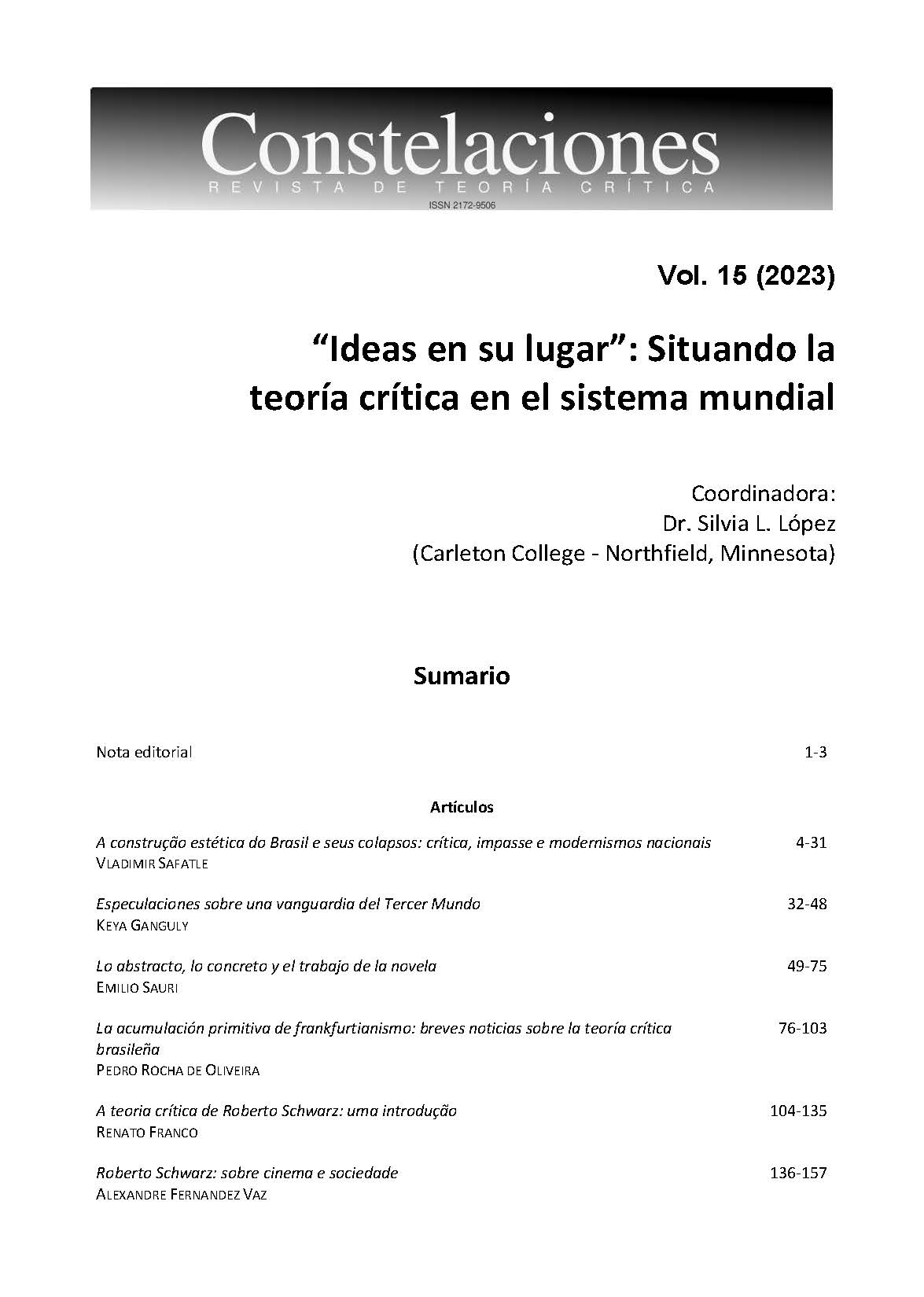On one Side as on the Other. Paulo Arantes: War, Borders and the End of History
Keywords:
war, frontier, end of history, peripheryAbstract
We will start from the critical reading of the work of Francis Fukuyama proposed by Paulo Arantes to analyze the place of war, the relevance of the notion of frontier and the understanding that there was an end of history, but that it is a different one, and how this conceptual constellation is decisive for the way in which the Brazilian philosopher dialectically interprets the present time as it has been configured since the end of the Soviet Union until today.
Downloads
References
ADORNO, Theodor W. (2022): Philosophy and Sociology: 1960, Cambridge, Polity.
ANDERS, Günther (2006): La Menace nucléaire. Considérations radicales sur l’âge atomique, Paris, Le Serpent à plumes.
ANDERSON, Perry (1992): O fim da história: de Hegel a Fukuyama, Rio de Janeiro, Zahar.
ARANTES, Paulo (1997): Extinção, São Paulo, Boitempo.
ARANTES, Paulo (2021): Formação e Desconstrução. Uma visita no museu da ideologia francesa, São Paulo, 34.
ARANTES, Paulo (2022a): Neoextrativismo depois da catástrofe, Disponível em:
https://www.youtube.com/watch?v=qfbzK9cTDhQ Data de acesso: 28 novembro 2023.
ARANTES, PAULO (2022b): “O mundo-fronteira”, Princípios: Revista de Filosofia, v. 29, n. 60: 10–32.
ARANTES, Paulo (2014): O Novo tempo do mundo. E outros ensaios sobre a era da emergência, São Paulo, Boitempo.
ARANTES, Paulo & KRENAK, Ailton (2020), Mesa Perspectivas anticoloniais MITsp. Disponível em: https://www.youtube.com/watch?v=2tjX2VodDYs. Data de acesso: 16 novembro 2023.
ARRIGHI, Giovanni (2010): The Long Twentieth Century:Money, Power and the Origins of Our Times, London/New York, Verso.
BADIOU, Alain (2022), “Treize thèses et quelques commentaires sur la politique aujourd’hui”, L’Obs. Disponível em: https://www.nouvelobs.com/idees/20220902.OBS62676/treize-theses-et-quelques-commentaires-sur-la-politique-aujourd-hui-par-alain-badiou.html. Data de acesso: 16 novembro 2023.
BOHY-BUNEL, Benoît (2023): Une critique anticapitaliste de la collapsologie, Paris, L’Harmattan.
CANETTIERI, Thiago (2020): A condição periférica, Rio de Janeiro, Consequência.
CAUX, Luiz Philipe de; CATALANI, Felipe (2019): “A passagem do dois ao zero: dualidade e desintegração no pensamento dialético brasileiro (Paulo Arantes, leitor de Roberto Schwarz), Revista do Instituto de Estudos Brasileiros, n. 74: 119-146.
CRARY, Jonathan (2014), 24/7, Lodon & New York, Verso.
DARDOT, Pierre & LAVAL, Christian (2010): La nouvelle raison du monde, Paris, La Découverte.
DURAND, Cédric (2020): Techno-féudalisme. Critique de l’économie numérique, Paris, La Découverte.
FASSIN, Didier (2010): La raison humanitaire. Une histoire morale du présent, Paris, Seuil.
FUKUYAMA, Francis (1992): O fim da História e o último homem, Rio de Janeiro, Rocco.
GODIN, Romaric (2023): “Vive la « polycrise » ! Grandeur et misère d’une notion à la mode”, Revue Le Crieur, n. 23: 66-79.
GUILLUY, Christophe (2014): La France périphérique : Comment on a sacrifié les classes populaires, Paris, Flammariom.
HARDING, Luke (2012). Mafia State: How One Reporter Became an Enemy of the Brutal New Russia, London Guardian Books.
HOCHSCHILD, Arlie Russell (2016): Strangers in Their Own Land: Anger and Mourning on theAmerican Right, New York, The New Press.
HOCHULI, Alex; HOARE, George e CUNLIFFE, Philip (2021): The End of The End of History, London, Zero Books.
JAPPE, Anselm (2017): La Société Autophage, Paris, La Découverte.
KRENAK, Ailton (2020): Ideias para adiar o fim do mundo, São Paulo, Companhia das Letras.
KURZ, Robert (1997): “A origem destrutiva do capitalismo”, Últimos combates, São Paulo, Vozes.
KURZ, Robert (1992): O Colapso da modernização, São Paulo, Paz e Terra.
LYRA, Frederico (2021): “Entrevista: Paulo Arantes o outro sentido. Uma teoria crítica na periferia do capitalismo”, Passages de Paris, n. 21, p. 261-275.
MARCUSE, Herbert (1973), Contre-révolution et révolte, Paris, Seuil.
MARX, Karl (2011), Grundrisse, São Paulo, Boitempo.
MENEGAT, Marildo (2019): A crítica do capitalismo em tempos de catástrofe, Rio de Janeiro, Consequência.
MENEGAT, Marildo (2021): “Tremor e cataclisma da segunda natureza – A Guerra como modelo da dissociação catastrófica do capitalismo”, Passages de Paris, n. 21, p. 6-22.
STIEGLER, Barbara (2019): “Il faut s’adapter”. Sur un nouvel impératif politique, Paris, Gallimard.
STREECK, Wolfgang (2016): How will capitalism end?, London/New York, Verso.
WARK, McKenzye: Capital Is Dead:Is This Something Worse?, London/New York, Verso.
ŽIŽEK, Slavoj (2009), “How to begin from the begining”, New Left Review, n. 57. Disponível em: https://newleftreview.org/issues/ii57/articles/slavoj-zizek-how-to-begin-from-the-beginning. Data de acesso: 17 novembro 2023.
Downloads
Published
How to Cite
Issue
Section
License
Copyright (c) 2023 Frederico Lyra de Carvalho

This work is licensed under a Creative Commons Attribution-NonCommercial-ShareAlike 4.0 International License.
Authors who have publications with this journal accept the following terms:
1. Authors will retain their copyright and grant the journal the right of first publication of their work, which will be simultaneously subject to the License of recognition of Creative Commons CC BY-NC-SA 4.0 that allows third parties to share, redistribute and adapt the work provided it is for non-commercial purposes and its author and first publication in this journal is indicated.
2. Authors may adopt other non-exclusive distribution license agreements for the version of the published work (e.g., depositing it in an institutional electronic archive or publishing it in a monographic volume) provided that the initial publication in this journal is indicated.
3. Authors are permitted and encouraged to disseminate their work via the Internet (e.g., in institutional telematic archives or on their website) before and during the submission process, which can produce interesting exchanges and increase citations of the published work. (See The Effect of Open Access).
Data confidentiality
1. Constelaciones. Revista de Teoría Crítica guarantees that the data you send us will only be used to meet the requests made in this message.
2. Your data will not be passed on to third parties.
3. You may request that your data be removed from our records at any time.





